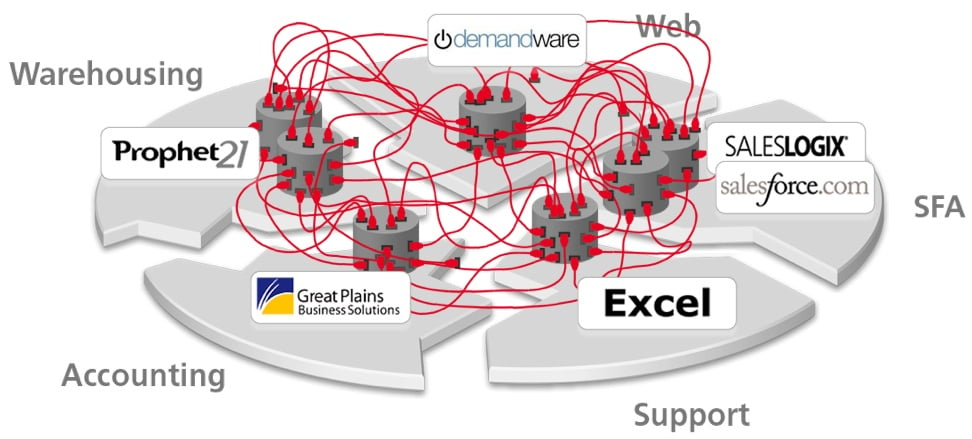The retail paradigm has shifted toward unified commerce and if you’re a retailer you should be taking a long serious look at NetSuite and its capabilities.
NetSuite offers retail omnichannel software solutions that are cost effective to acquire and can be deployed quickly and scale as your business needs evolve and grow.
Want to see how NetSuite supports smarter retail decisions? Start with a pricing estimate built for CFOs and finance teams.
The Omnichannel Retail Model
For anyone in the retail industry, omnichannel is not new news but it remains the model most retailers are aspiring to. And, if you’re not doing it you’re likely falling behind.
TechTerget’s Definition of OmniChannel Retail: “A multichannel approach to sales that seeks to provide the customer with a seamless shopping experience whether the customer is shopping online from a desktop or mobile device, by telephone or in a bricks and mortar store.”
What distinguishes the omnichannel customer experience from the multichannel customer experience is that there is true integration between channels on the back end. In the modern era of everyone owning a mobile device and having wifi access, customers should be able to seamlessly transition from one sales medium to another, carrying with them all of their purchase history. Sales associates, in turn should have access to this rich customer history and thus be empowered to make informed suggestive selling options vs. simply taking orders at the cash wrap. So not only does omnichannel retail create an easier path to purchase (and consequently more purchases), it also allows for higher units per transaction and average ticket sizes through said in-store suggestive selling.
How did NetSuite jump ahead of incumbent retail software solutions?
By good fortune, good judgment, or a bit of both, NetSuite is perfectly geared for omnichannel retail. But how? Before NetSuite even focused on retail, they were marketing the benefits of a single platform. They beautifully referred to the disparate mess of weakly integrated silo’ed systems as the hairball. The info graphic below nicely depicts the situation.

The ‘hairball’ has numerous problems (that really matter for omnichannel retail): The robustness of a system is only as strong as the weakest link / integration. Omnichannel retail means there are A LOT of integrations to build, monitor and maintain. For instance, a customer might start in a physical store, buy a gift card, and seek for that gift card to be used online. That requires integrations between, POS and Ecommerce platform, E-commerce platform to Order Management System, E commerce to Accounting Systems, and Order Management to Accounting Systems.
Now consider all the ways a customer could transact – buying a gift card online and wanting to use it in a store, buying online and wanting to pick-up in-store, or even a sales associate wanting to look at Ecommerce transaction history. In that context you get a view of just how tangled, numerous and daunting the maintenance of those integrations could be. Each integration is costly to create, time consuming to maintain and often prone to error.
The secondary affects are two-fold. You lock yourself into to every piece of your tech-stack. You simply can’t rip and replace a single piece like the POS. Why? Because there are a slew of integrations built around each and every component of hairball and thus a slew of integrations will need to be re-written, tested and maintained. Should you want to run a new program. For illustration let’s say a loyalty program. That means, all the transactional components (POS / Ecommerce platform) now need to be enhanced to deploy this program.
Now consider the alternative. With NetSuite (and Partners who build on NetSuite’s platform), everything is locked into a single platform. There is one customer record, one item record, one gift certificate, one employee in a single and common database. That means: You get to be Omni-channel out of the box. There is a single business truth! Gone are the days that internal meetings start with “why are my numbers different than your numbers?” and 20 minutes of wasted time.
So What Is The Downside?
The one big caveat is you must utilize products built explicitly for NetSuite. Bespoke integrations or even connectors are still connections to systems outside of the NetSuite ecosystem and suffer the exact same flaws as any integration in the hairball. The downside is that you’re locked into certain vendors that build for NetSuite for the key components in your tech-stack. Thus, the ultimate question for you as a retailer should be asking is: “Do the benefits of a singular business platform outweigh a best of breed approach for each and every component of a retail business tech stack?”
In my mind, having seen both options, I would say that the benefits of single platform vastly outweigh the specialized abilities of a particular best of breed system for a number of reasons:
NetSuite has a tremendous partner ecosystem that develops great products that are comparable with other best of breed applications, in fact that’s the reason I now work for one of those companies (SuiteRetail). It was the strength of that product offering that compelled me to leave my CFO role at Dylans Candy Bar to help other NetSuite retailers with their POS challenges. In my past, I’ve wasted countless hours reconciling inventory, items and sales between systems. That means critical business decisions take a lot of time or worse yet, can be misinformed.
Decision Time – Whats the Bottom Line
The decision as to integrating best of breed or going for a single platform is of course yours but the trend is unequivocal. The reason Salesforce acquired Demandware (mainly an e-com platform) was to move CRM and a transactional platform closer together. It’s also the reason Oracle acquired Micros, why Demandware acquired Tomax. There’s an undeniable consolidation of bi-furcated industries to create customer focused eco-systems. The industry’s biggest players are, dare I say it, following NetSuite’s model.
Are you part of a fast growth organization preparing to scale your business on NetSuite for retail? Consider working with a NetSuite Solution Provider like Cumula 3 Group to assist you in your NetSuite evaluation process.
From inventory to margins, NetSuite gives CFOs clarity—get custom pricing insights and explore how Cumula 3 Group supports retail finance leaders.
About the Author: David Reid previously served as the CFO of Dylans Candy Bar and is currently the VP of Business Development at SuiteRetail, a software company that develops natively integrated POS solutions purpose built for NetSuite and Salesforce.com ecosystems.







